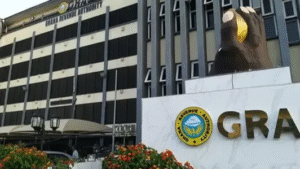
The Ghana Revenue Authority (GRA) has announced the implementation of several key tax policy reforms, set to take effect from July 1, 2025, as part of efforts to enhance domestic revenue mobilisation and reduce reliance on external financing.
Among the reforms are the Modified Taxation Scheme (MTS), Value Added Tax (VAT) on Real Estate Transactions, and VAT on Non-Life Insurance Premiums.
Modified Taxation Scheme (MTS): A Simplified Tax Framework for the Informal Sector
The MTS introduces a streamlined tax system aimed at micro, small, and medium-sized enterprises (MSMEs) across the country. Developed under the Income Tax Act, 2015 (Act 896), the scheme is designed to ease compliance and broaden the tax net.
At a recent media engagement, the Acting Commissioner-General of the GRA, Mr. Anthony Kwasi Sarpong, emphasized that the MTS is not a new tax but a simplified approach to personal income tax for eligible businesses.
“As implementers of tax policy, our mandate is clear. The President, supported by the Finance Minister, has called for increased domestic revenue to support critical budgetary needs, especially as many donor partners have reduced their support. This initiative is part of a broader strategy to close revenue gaps—not to overburden Ghanaians, but to realign the economy,” Mr. Sarpong stated.
Key Features of the MTS:
- Eligibility: Ghanaian residents earning income solely from business activities within the country.
- Tax Categories:
- Payment Options: Via mobile money, USSD (*222#), or bank deposit.
- Simplified Registration: Available at GRA offices and through a dedicated mobile app.
In addition to the MTS, the GRA is intensifying efforts under the Special Voluntary Disclosure Program (SVDP), introduced in 2024. The program allows residents with foreign-earned income that has not been taxed to voluntarily disclose such income without penalties, in accordance with the income tax law.
May Interest YouGhana’s Inflation Outlook: World Bank Projects 17.2% for 2025
Bank of Ghana to Integrate AI and Technology into Collateral Registry Operations
VAT on Real Estate: New Requirements for Estate Developers
From July 1, 2025, the GRA will enforce VAT regulations under the VAT (Amendment) Act, 2023 (Act 1107), requiring estate developers to apply VAT on the supply and rental of immovable property.
- 5% VAT applies to:
- 1% COVID-19 Levy remains applicable on these transactions.
- Exemptions: Residential dwellings and agricultural properties are exempt.
Additionally, withholding agents who fail to remit VAT by the 15th of the month following the due date will be liable for the tax amount and a 30% penalty.
VAT on Non-Life Insurance Premiums
Also under Act 1107, insurance companies must begin applying 15% VAT on a range of non-life insurance products, including:
- Fire, marine, property, liability, and indemnity insurance
- Engineering, burglary, personal accident, workmen’s compensation, and travel insurance
To ensure smooth implementation, insurance companies are advised to:
- Update their accounting and invoicing systems;
- Train staff on the new requirements;
- Inform clients about the changes;
- Register for VAT if not already registered.
Towards a More Robust Tax System
These reforms reflect a holistic approach to revenue generation, focusing on simplifying compliance, expanding the tax base, and ensuring that all sectors contribute equitably to national development. The GRA reiterated its commitment to facilitating the transition through stakeholder engagement, education, and support mechanisms.


